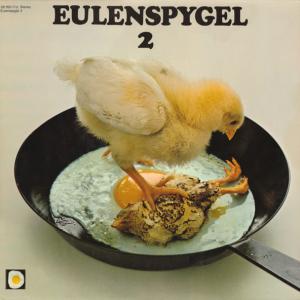Strawberry Bricks Entry:
Founded in 1965, the Royal Servants was a beat-era band from Reichenbach, Swabia, in the southwest of Germany. Like most groups of the era, their music matured from beat to psychedelic to something a little more progressive. We, the group's first album, was recorded in 1970 for the Swiss Elite Special label. A curious mix of organ, driving rhythm and English-language lyrics, it was a competent work of the era. But after sharing a bill with the German-language rock pioneers Ihre Kinder, a band from Nuremberg that shared similar beat-era roots (as Jonah & The Whales), the Royal Servants rebranded themselves as Eulenspygel-after Till Eulenspiegel, a figure in medieval folklore (literally "owl glass")-and began singing in their native tongue. Featuring original Servant and guitarist Matthias James "Till" Thurow with later Servants Ronald "Ronnie" Libal on bass, Günter Klinger on drums and Detlev Nottrodt on guitar, the band included Rainier "Mulo" Maulbetsch on vocals, Karlheinz Großhans on organ and Cornelius Hauptmann on flute. Signing to the Intercord imprint Spiegelei (literally "mirror egg," but German for "sunny-side up" which may explain the album's cover), their "second" album was released in Autumn 1971. The bluesy riff of "Till" rips open the album, revealing the baritone voice of Maulbetsch. "Son My" breaks down to a driving kosmische groove, with the dual guitars of Thurow and Nottrodt trading licks over Hauptmann's flute and Großhans's organ. "Konsumgewäsche" ("Consumption") cops a mean break, but the lyric's political message-as with many German bands of the era-is lost to the non-native speaker. "Staub Auf Deinem Haar" ("Dust on Your Hair") again features a jazzy groove, but the opening of "Das Lied Vom Ende" ("Song of the End") begins with classical ambitions, before descending into the band's shifting and rhythmic meters, here with Thurow adding violin. The band had significant support from their record label, and toured extensively in support of the album. Highlighted by the epic track "Abfall," Eulenspygel recorded a second album, Ausschuß ("Committee"), at The Beatles' Apple Studios in 1972, but further recordings failed to materialize, and by 1973 the band had called it a day.



